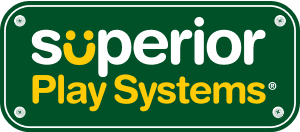7 Benefits of Playground Equipment for Your Child’s Development
August 10, 2020
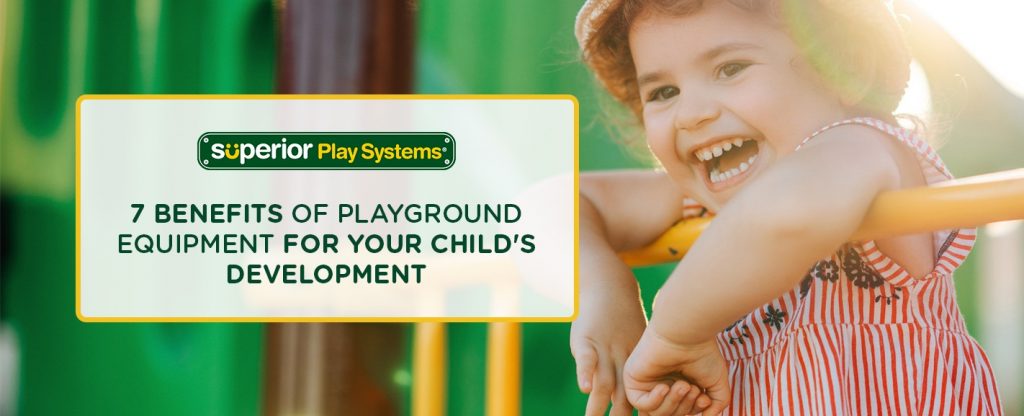
7 Benefits of Playground Equipment for Your Child’s Development
Some of parents’ most joy-filled moments involve watching their kids happily playing. Parents might not realize their little ones are developing critical skills as they laugh and run around. Kids need to play to learn about the world and develop their minds and bodies. And, since playing is so much fun, it’s also a great stress reliever.
You might think of playground equipment as a tool to help kids grow. Playground equipment encourages kids to unleash their imaginations, interact with other children and move their bodies. As a result of playing, kids develop mental, physical and social skills without even realizing it. In this guide, we’ll show you how playground equipment helps child development and examine the benefits of play overall.
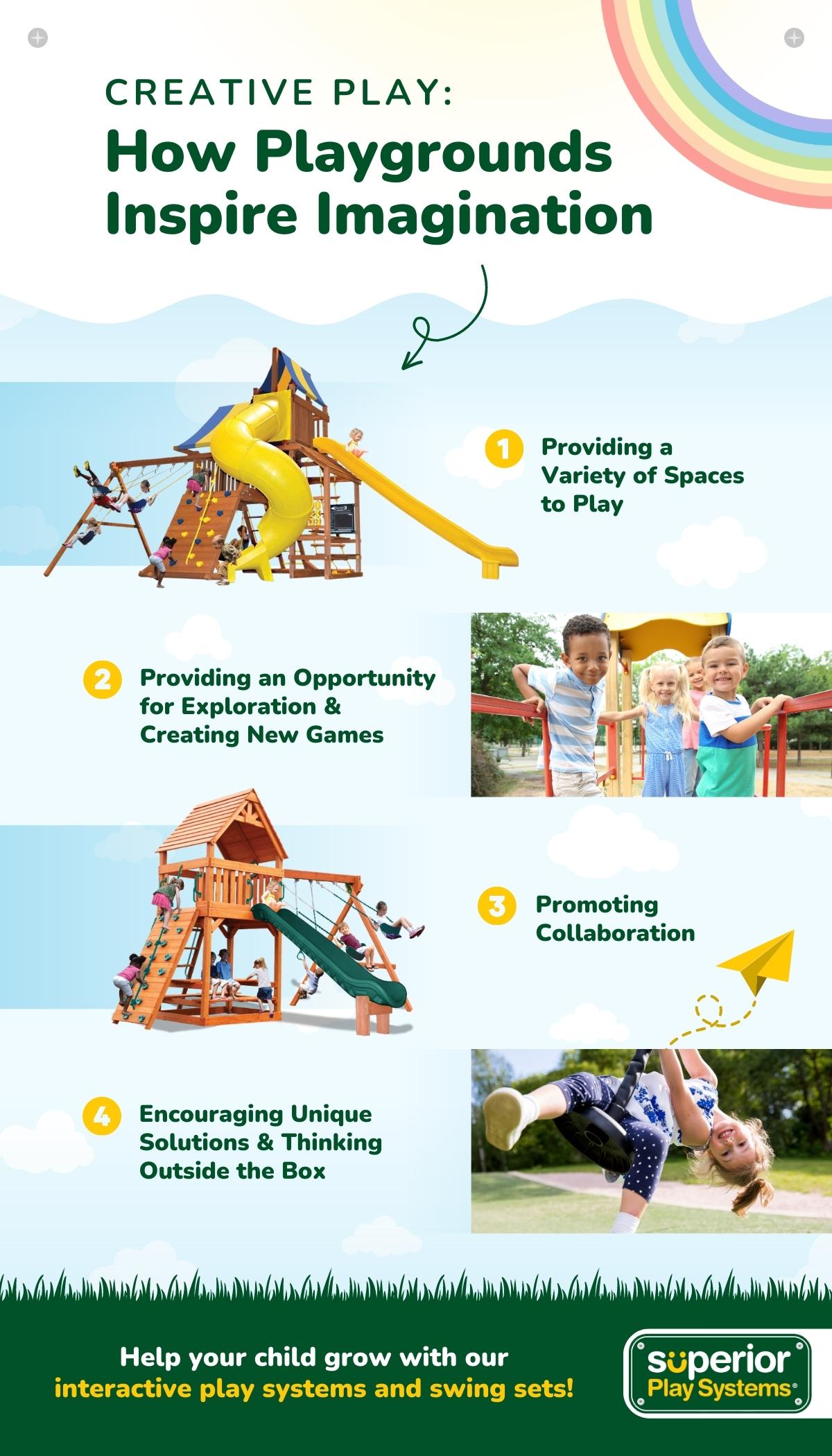
The Importance of Play in Child Development
It’s hard to imagine a childhood without play. Play is an essential component of a child’s health and development for so many reasons. When kids play, they learn about themselves, others and their surroundings. They get the exercise they need to support bone and muscle health. Here are some of the greatest developmental benefits of play for children:
Physical Benefits of Play
Playing helps kids develop gross and fine motor skills. Gross motor skills include those that use the large muscles in the body. When kids throw and catch balls or play on playground equipment, for example, they use and develop gross motor skills. These skills allow kids to complete everyday tasks, such as standing, walking and sitting upright.
Playing also helps kids build fine motor skills. Fine motor skills use the muscles in the wrists and hands. These skills allow children to complete tasks like writing, drawing and brushing their teeth. When kids play with toys, work on puzzles or hold onto play equipment, they get to use the muscles in their hands and develop fine motor skills. At the same time, they are also developing hand-eye coordination, which will help them read, participate in sports and become more independent overall. Here are more ways playtime helps kids grow and stay healthy:
- Burns calories
- Improves balance
- Increases flexibility
- Promotes adequate sleep
Overall, play helps kids develop strong bodies and adopt healthy lifelong habits.
Social Benefits of Play
Play teaches kids how to get along with other children. Through play, kids learn how to cooperate, share, negotiate, take turns and treat others with fairness and kindness. They get to practice problem-solving skills as they resolve conflicts with other kids and work together as a team.
Playing also gives kids a chance to build friendships and communicate their thoughts and ideas to other children. It’s a great way for kids to practice and develop empathy, which will help them relate to others throughout their lives.
Mental and Emotional Benefits of Play
Play is essential to a child’s emotional well-being. It provides an outlet for kids to explore their emotions and work through their fears. For example, children might pretend they are combatting a scary monster as they play, which gives them a sense of control and allows them to express their feelings in a safe environment.
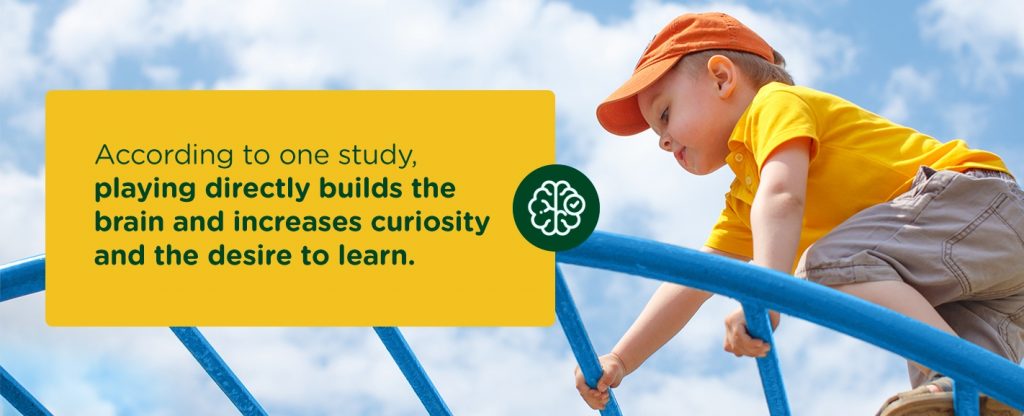
Playing also helps kids perform better in school. According to one study,
playing directly builds the brain and increases curiosity and the desire to learn. The same article explains how high amounts of play are related to low levels of cortisol, which may mean that playing can drastically reduce harmful stress levels and help kids cope with challenges.
Benefits of Play for Different Age Groups
Play is important for all children and all ages. Here’s how play benefits kids as they go through various stages of childhood:
Infants and Toddlers
Children age three and under are physically growing and developing gross motor skills. Kids in this age group play by interacting with the world around them, and they’re learning how to do things like walk and use their hands. Every new skill a young child learns allows them to progress to the next developmental stage.
It’s important kids stay active throughout the day to keep on track with their development. Generally,
toddlers shouldn’t be inactive for more than an hour when they aren’t sleeping. Here are the benefits of play for very young kids:
- Builds vocabulary
- Develops motor skills
- Enables emotional expression
- Teaches sharing and how to play with others
School-Age Kids
As children enter their school years, they have a lot more physical skills than when they were babies. They can jump, skip, walk and climb, and they have tons of energy. However, school-age kids still have a lot of growing to do, such as building their fine motor skills, developing social skills and finding healthy ways to cope with stress. Since the human brain doesn’t stop developing until much later in life, playing supports healthy brain growth, too. Here are the benefits of play for school-age children:
- Teaches them to play well with others
- Encourages independence
- Provides a chance to use and build imagination
- Relieves school-related stress
- Supports fitness
- Builds strong relationships
- Develops fine motor skills
Older Kids
Older kids and adolescents still need to play. Kids in this age group enjoy competition, are better at understanding and following rules and have the physical skills required to play a range of sports and games.
Older kids likely face greater academic stress than young children, and they need healthy ways to express their emotions. It’s also critical older kids continue to stay active. According to the World Health Organization,
more than 80% of adolescents do not get the recommended amount of exercise every day. Here’s how playing benefits older kids:
- Encourages physical activity
- Relieves stress
- Improves friendships
- Teaches teamwork
- Stimulates creativity
- Develops problem-solving skills
- Provides an outlet for complex emotions
- Promotes self-discovery
7 Benefits of Playground Equipment for Child Development
Playground equipment provides numerous opportunities for kids to participate in unstructured, active play. This type of play enables kids to move freely, interact with others and explore the world on their own, helping them develop many skills in the process. Here are just some of the developmental benefits of playground equipment:
1. Boosts Physical Skills
Kids in any age group can practice their motor skills when they play on playground equipment. For example, when a child climbs up a ladder or pushes a swing, they are using both gross and fine motor skills.
Kids also build hand-eye coordination and balancing skills when they climb to the top of a slide or use their whole body to glide through the sky on a swing. Since playground equipment is so much fun to use, kids don’t even notice they are building critical physical skills they’ll use for life.
2. Gets Kids Outside to Develop Their Senses
Fun and exciting playground equipment motivate kids to shut down their computers and head outdoors. When kids play outside, they get to enjoy rich sensory experiences that simply cannot be replicated inside a building. For example, they get to look at the expansive sky, feel the sun on their skin, listen to birds chirping in the trees and smell the freshly cut grass. All of these elements help kids develop their senses, which adds pleasure to life.
3. Builds Strength
Remember swinging across the monkey bars as a kid? If you can recall, it may have felt like an obstacle you couldn’t wait to conquer. It takes strength to use playground equipment, but kids enjoy the challenge and love to see what they can accomplish. As a result, they have fun as they strengthen their hearts and build their arms, legs and core muscles.
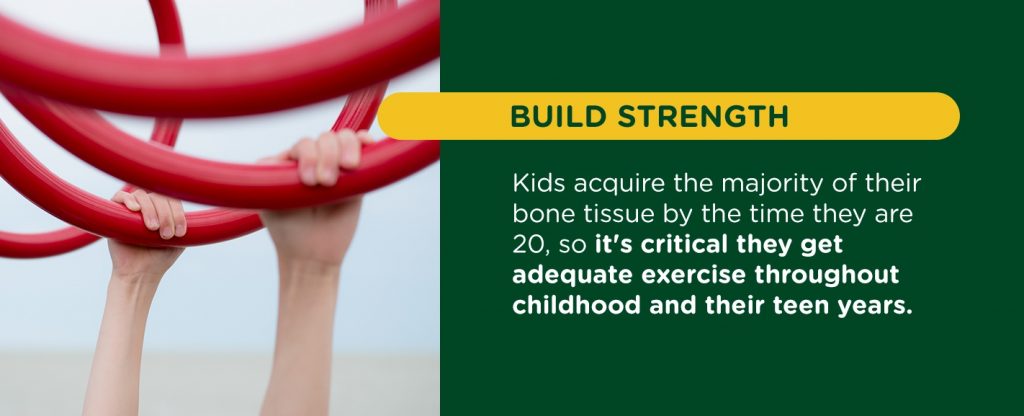
Using playground equipment also helps kids build stronger bones. According to the National Institutes of Health,
kids acquire the majority of their bone tissue by the time they are 20, so it’s critical they get adequate exercise throughout childhood and their teen years. Kids should participate in activities that strengthen their muscles and bones, such as climbing and playing on playground equipment,
at least three days a week.
4. Teaches Social Skills
All kids want to enjoy playground equipment, but they can’t always use the same piece at the same time. This requires kids to practice patience and develop social skills like sharing, listening, negotiating and compromising. When kids communicate with each other successfully, they learn how fun it can be to take turns and get along.
Kids also get to strengthen their bonds with friends as they use playground equipment. Friendships help kids learn about their own identities, relieve stress and enjoy greater self-esteem. Overall, friendships make a positive impact on health and well-being.
5. Stimulates the Imagination
Playground equipment encourages kids to explore the world around them and use their imaginations. They might come up with new games to play using playground equipment, or pretend they are princes or princesses guarding a castle. There are all kinds of stories kids can invent to enjoy their play equipment even more and use their imaginations. Imaginative play leads to
increased cognitive flexibility and creative achievement, helping children reach goals throughout their lives.
6. Develops Problem-Solving and Decision-Making Skills
Sometimes kids have to make decisions or solve problems when they use playground equipment. For example, a child on a swing has to decide whether or not they want to go higher or stay closer to the ground. A child who has never ridden on a slide before needs to consider how they will get down. Playground equipment requires children to weigh the risks and benefits of many actions, which helps them develop a range of cognitive skills.
7. Fosters Independence
When kids play outside on playground equipment, they feel free. They get to burn energy and move around in ways they can’t indoors. This type of freedom helps children develop a sense of independence.
Types of Playground Equipment and Their Benefits

Each piece of playground equipment offers a unique way of helping a child grow. Here’s a look at the different types of play equipment and how they promote development and well-being:
Playsets
Playsets include all the things kids love, such as:
- Swings: Gliding on a swing is a great way for kids to unwind and take in their surroundings. Swinging has a lot of benefits for kids’ development, too. Gripping the chains helps kids develop fine motor skills, and sitting on a swing requires balance. Kids develop gross motor skills and coordination as they hold on tight and pump their legs to reach the sky.
- Slides: Zipping down a slide is a ton of fun, and it motivates kids to get a workout. Kids love the reward of a fun ride, so they are willing to climb to the top of the slide again and again. Young kids build confidence as they enjoy the thrill and excitement of sliding for the first time.
- Climbers: Climbing equipment like rock walls and monkey bars allows kids to build confidence as they overcome challenges and figure out how to make it to the next level. Climbers also build strength, motor skills and coordination. Plus, kids can use their imagination and pretend a rock wall is part of a make-believe world.
- Forts: Forts encourage kids to use and develop their imaginations, and they easily fit into games or other forms of play. When kids see a fort, they naturally want to step inside and pretend it’s their house, ship, castle or secret hiding spot. Also, kids can’t wait to climb the ladder or rock wall to hang out with their friends in the fort.
Trampolines
Trampolines are hard to resist because they are just so much fun. Trampolines also provide a great workout and a way for kids to develop physical skills, like coordination and balance. If you’re looking for a solution to motivate older kids or teens to get outside and get their hearts pumping, you’ll want to consider a trampoline.
Basketball Hoops
Playing a game like basketball is great for kids’ development. Basketball allows kids to build coordination, get exercise and use problem-solving skills and critical thinking to come up with winning strategies. Sports like basketball also enable kids to recognize the value of teamwork, resilience and perseverance. Lastly, kids get to strengthen the bonds they share with family and friends as they get in shape and enjoy fun competition.
Children and teens who enjoy playing basketball can benefit greatly from having their own
basketball hoop. With the ability to shoot hoops whenever they want, kids can easily get exercise and enjoy it at the same time.
Browse Playground Equipment Today
Playground equipment is designed to promote safe, joy-filled play and help kids grow. If you’re interested in purchasing a playset to foster your child’s development and well-being, we’re here for you at Superior Play Systems®. As The Most Trusted Name in Play
®, we are proud to help parents bring hours of fun and physical activity to their backyards with high-quality playsets, basketball hoops, trampolines and accessories.
For more information about our play equipment,
contact us today or
visit us at one of our locations. If you’d like to learn more about playground activities that help child development, check out our blog.
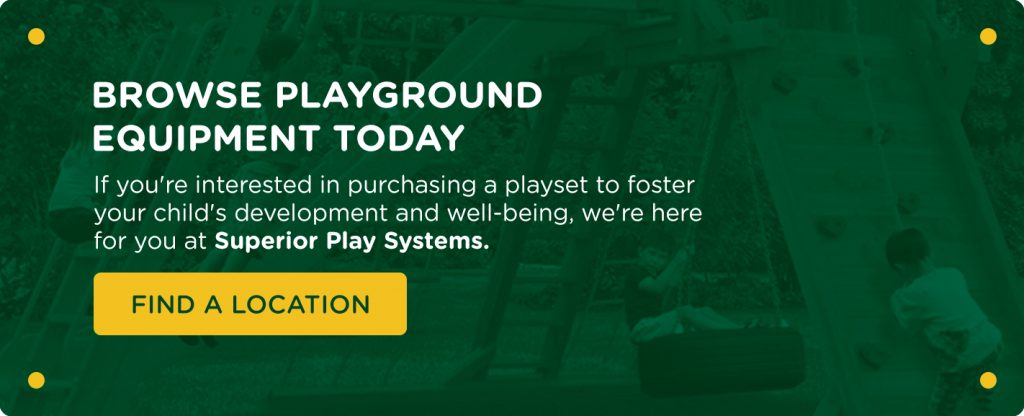


 Playing also helps kids perform better in school. According to one study, playing directly builds the brain and increases curiosity and the desire to learn. The same article explains how high amounts of play are related to low levels of cortisol, which may mean that playing can drastically reduce harmful stress levels and help kids cope with challenges.
Playing also helps kids perform better in school. According to one study, playing directly builds the brain and increases curiosity and the desire to learn. The same article explains how high amounts of play are related to low levels of cortisol, which may mean that playing can drastically reduce harmful stress levels and help kids cope with challenges.
 Using playground equipment also helps kids build stronger bones. According to the National Institutes of Health, kids acquire the majority of their bone tissue by the time they are 20, so it’s critical they get adequate exercise throughout childhood and their teen years. Kids should participate in activities that strengthen their muscles and bones, such as climbing and playing on playground equipment, at least three days a week.
Using playground equipment also helps kids build stronger bones. According to the National Institutes of Health, kids acquire the majority of their bone tissue by the time they are 20, so it’s critical they get adequate exercise throughout childhood and their teen years. Kids should participate in activities that strengthen their muscles and bones, such as climbing and playing on playground equipment, at least three days a week.
 Each piece of playground equipment offers a unique way of helping a child grow. Here’s a look at the different types of play equipment and how they promote development and well-being:
Each piece of playground equipment offers a unique way of helping a child grow. Here’s a look at the different types of play equipment and how they promote development and well-being:

